Food for thoughts
Aug. 24, 2022
Thesaurus : Doctrine
Référence complète : E. Vergès, G. Vial, O. Leclerc, Droit de la preuve, 2ième éd., Thémis Droit, PUF, 2022, 780 p.
____
Aug. 18, 2022
Compliance: at the moment
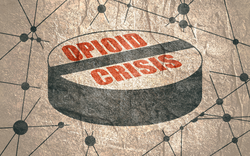
Référence complète : Frison-Roche, M.-A., "La responsabilité systémique, réponse judiciaire à la crise des opioïdes", Newsletter MAFR Law, Compliance, Regulation, 18 août 2022.
____
Les jugements se succèdent aux Etats-Unis. Comme le rapporte un article paru dans le New-York Times du 17 août 2022, CVS, Walgreen and Walmart Must Pay $650.5 Million in Ohio Opioid case, "A federal judge ordered the big pharmacy chains to bear partial responsibility for the deadly drug crisis.".
L'article relate le jugement rendu par un juge fédéral de l'Ohio, qui condamne des chaînes de pharmacies, jugement contre lequel celles-ci font appel.
Il y a des milliers de cas certains jugés, d'autres en attente, certains ayant abouti contre des laboratoires, d'autres contre des chaines de pharmacies, certains ayant abouti à des condamnations, d'autres non. Les condamnations déjà prononcées ont fait l'objet d'appel de la part des entreprises condamnées, ici des chaines de pharmacies, antérieurement des laboratoires pharmaceutiques.
Ce qui est qualifiée de "crise des opioïdes" renvoie à la prescription massive d'opioïdes, initialement simplement anti-douleurs puis drogues consommées massivement par des personnes non atteintes de douleurs, produits pourtant prescrits par des médecins et vendus par des "drugstores" et autres pharmacies, ce qui a entraîné de nombreux morts par overdose, chacun sachant que les posologies n'étaient pas suivies, des "moulins à réduire en poudre les pilules étant facilement disponibles sur Internet, les consommateurs ne souffraient pas de pathologies justifiant ces prises trouvant très facilement médecins et pharmaciens pour s'approvisionner en toute légalité. Mais personne n'a eu de rôle causal direct dans ce système où tout était conforme à la réglementation car les Autorités de régulation, notamment celles en charge des médicaments ne sont pas intervenues, et les consommateurs connaissaient les risques attachés à une telle consommation.
Mais les systèmes qui ne sont pas ou mal régulés en Ex Ante sont "régulés" en Ex Post et le temps des responsabilités arrive toujours. La crise des opioïdes, ses victimes ou les proches des personnes décédées, sont désormais par milliers devant les tribunaux américains.
Selon la procédure américaine, dans le cas présent, c'est tout d'abord un jury qui, en novembre 2021, a déclaré les entreprises défenderesses partiellement responsables des décès des consommateurs d'opioïdes ; c'est maintenant le Juge fédéral de de Cleveland qui évalue les dommages et intérêts correspondant à cette responsabilité.
Ce cas est particulièrement intéressant car les consommateurs savaient pourtant ce qu'elles faisaient et les médicaments étaient bien fournis sur ordonnances légalement délivrées, les pharmacies ayant eu un comportement licite et n'ayant pas eu un rôle causal direct dans la crise qui entraîna de très nombreuses victimes. C'est d'ailleurs pourquoi d'autres juridictions, notamment en Californie, n'ont pas voulu engager leur responsabilité.
Si la juridiction de l'Ohio a pourtant retenu la responsabilité des chaines de pharmacie, c'est parce que, dans ce système que l'on pourrait "réglementairement conforme", elles ont participé à la diffusion d'une "nuisance publique" (public nuisance) en n'avertissant pas elles-mêmes sur les dangers de la substance et en délivrant massivement le produit à des personnes manifestement droguées, alimentant un système nocif.
Il s'agit donc d'un raisonnement "téléologique", s'appuyant sur les finalités, adopté dans une perspective systémique.
Dans le système libéral américain, les tribunaux peuvent ainsi engager la responsabilité et des laboratoires pharmaceutiques et des chaînes d'officines pharmaceutiques si cette perspective systémique est adoptée.
En raison du caractère systémique de ce cas car ce système de cette drogue licite a fait de très nombreux morts pourrait se dessiner une "responsabilité systémique", même dans un pays où le principe de la liberté de l'individu qui prend ses risques demeure acquis, et même si cela devait être avant tout au Régulateur public d'intervenir pour prévenir, informer et empêcher cette hécatombe.
Pour l'instant, car le Droit de la Responsabilité est lent, les premières décisions sont prises, sont divergentes selon les différents Etats. Elles sont observées par l'ensemble du secteur médical car c'est la notion même de Responsabilité qui est ici dessinée.
Un tel raisonnement systémique pourrait être repris au-delà de ce secteur. Il pourrait ainsi être repris à propos d'un autre produit dangereux que les vendeurs et prescripteurs présentent comme sûr et profitable : les jetons, souvent appelés "cryptomonnaies". Lorsqu'arriveront les dommages massifs engendrés par la crise de ceux-ci, les victimes pourront-elles se retourner pareillement contre les prescripteurs et les vendeurs ?
Le cas est systémiquement analogue, puisqu'il s'agit de la conception que l'on peut avoir de la causalité. Il faut alors choisir de conserver la conception traditionnelle de la Responsabilité ou une conception systémique de celle-ci, qui fait peser sur les "opérateurs cruciaux" une Responsabilité non plus Ex Post mais Ex Ante. C'est un choix.
Comme le souligne l'avocat des chaines de magasins condamnés, se référant à la conception classique des conditions d'engagement de la responsabilité, les pharmaciens n'ont pas eu de rôle causal direct : (extrait de l'article") “We never manufactured or marketed opioids nor did we distribute them to the ‘pill mills’ and internet pharmacies that fueled this crisis,”".
Ils estiment donc que c'était pas à eux de faire le travail qu'en Ex Ante les Etats et les Régulateurs n'ont pas fait : (extrait de l'article) " “Instead of addressing the real causes of the opioid crisis, like pill mill doctors, illegal drugs and regulators asleep at the switch, plaintiffs’ lawyers wrongly claimed that pharmacists must second-guess doctors in a way the law never intended and many federal and state health regulators say interferes with the doctor-patient relationship. ”.
L'on peut en effet soutenir que les pharmaciens ne sont pas des régulateurs en second niveau, ils n'ont pas à gérer les défaillances des autres, à prévenir les crises systémiques.
La question est effectivement d'une part de déterminer si les opérateurs cruciaux (que sont dans le secteur médical les médecins, les pharmaciens, les laboratoires) ont ou n'ont pas un tel rôle ; et d'autre part de savoir si c'est aux juridictions de répondre à une telle question, étant observé que répondre en affirmant que les pharmaciens avaient ce rôle-là est audacieux et suppose que l'on met à leur charge une "Responsabilité Ex Ante".
Dans une perspective systémique, et parce que cela aurait évité bien des morts, l'on aurait tendance à répondre que les pharmaciens auraient dû jouer ce rôle systémique et que le Droit de la responsabilité est la branche la plus politique et la plus créative du Droit.
Mais n'oublions pas que la Cour suprême des Etats-Unis vient d'affirmer le 24 juin 2022 que le juge doit être modeste et ne pas avoir d'ambition pour les autres, y compris pas pour sauver des vies, le climat ou protéger les femmes. L'on peut donc préférer une vision plus traditionnelle du Droit de la responsabilité où celui qui ferme les yeux et n'agit pas alors qu'il est au cœur du système n'est pas responsable dès l'instant qu'on ne lui en a pas expressément confié la tâche. .
___________________________________________________
🔴Sur la comparaison du droit français appliqué à cette cause systémique des opioïdes : Th. Thouret, 📝Le pharmacien, un "opérateur crucial" pour prévenir une crise des opiacés en France, 2020
🔴Sur la notion même de "cause systémique", telle que les juridictions doivent les appréhender : 𝒎𝒂𝒇𝒓, M.-A. Frison-Roche, 🎥 𝑳'𝒉𝒚𝒑𝒐𝒕𝒉è𝒔𝒆 𝒅𝒆 𝒍𝒂 𝒄𝒂𝒕é𝒈𝒐𝒓𝒊𝒆 𝒅𝒆𝒔 𝒄𝒂𝒖𝒔𝒆𝒔 𝒔𝒚𝒔𝒕é𝒎𝒊𝒒𝒖𝒆𝒔, 2022
🔴sur la notion de "Responsabilité Ex Ante" : 𝒎𝒂𝒇𝒓, 📝La Responsabilité Ex Ante, pilier du Droit de la Compliance, 2022
Aug. 8, 2022
Compliance: at the moment

Référence complète : Frison-Roche, M.-A., "Rendre plus coûteux l'accès au marché de la Haine, Newsletter MAFR Law, Compliance", Regulation, 8 août 2022.
____
|

Aug. 2, 2022
Publications

♾️ follow Marie-Anne Frison-Roche on LinkedIn
♾️ subscribe to the Newsletter MAFR Regulation, Compliance, Law
____
 ► Full Reference: M.-A. Frison-Roche, The judge, the obligation of compliance and the company. The probationary compliance system, Working Paper, August 2022.
► Full Reference: M.-A. Frison-Roche, The judge, the obligation of compliance and the company. The probationary compliance system, Working Paper, August 2022.
____
📝this Working paper had been made for an article:
📕 published in its French version ("Le juge, l'obligation de compliance et l'entreprise. Le système probatoire de la compliance") in the book La juridictionnalisation de la Compliance, in the series 📚Régulations & Compliance
📘published in tis English version in the book Compliance Jurisdictionalisation, in the series 📚Compliance & Regulation
____
► Summary of this Working Paper: To articulate the probationary system of compliance, it should first be admitted that Evidence is a general system, built on a "probationary square" functioning whatever the situation, and that it seems that Compliance Law rejects it, being incompatible with major probative principles, as soon as Compliance is defined as the obligation that companies would have to show (which is evidence) their respect for all the regulations applicable to them.
But fortunately, Compliance does not have to receive this definition. Compliance Law consists of all the principles, institutions, rules, and decisions which, in an alliance between public authorities and crucial companies, tend in a substantial way to the achievement of Monumental Goals. A branch of Ex Ante Law that protects systems and the human beings involved in them, Compliance Law aims to detect and prevent so that in the future systems will be less harmful than they would be if we do nothing, even will be better.
From this required action of companies, which requires the establishment of structures and series of behaviors, a specific probationary system emerges. It is composed firstly of specific proof objects, constituted on the one hand by the structures and on the other hand by the behaviors. Secondly, the specificity of compliance, often denounced, lies in the burden of proof, the burden of which rests on the company, but it is necessary to analyze the interference with the other branches of law, which compliance cannot have destroyed. . Thirdly, the scope of the probative issues is such that the means of proof have multiplied, according to the triptych of the effectiveness, efficiency and effectiveness expected of the compliance system itself regarding the Monumental Goals (and not the regulations). Fourthly, because Compliance Law is a branch of Ex Ante Law and the Judge is nevertheless at the center, it is logical that all efforts focus on the pre-constitution of evidence.
____
🔓read the developments below ⤵️
July 12, 2022
Thesaurus : 02. Cour de cassation
Référence complète : Crim., 12 juillet 2022, pourvoi n° 21-83.820 (publié au bulletin).
____
_____
July 6, 2022
Thesaurus : Doctrine
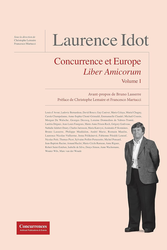
► Référence complète : L. d'Avout, "L'arbitrabilité sous condition : réflexions au départ de l'antitrust", in C. Lemaire & F. Martucci (dir.), Liber Amicorum Laurence Idot. Concurrence et Europe, vol. I, préf. C. Lemaire & F. Martucci, avant-propos B. Lasserre, Concurrences, 2022, pp. 177-192
____
► Résumé de l'article (fait par l'auteur) : "À travers l'arbitrabilité, l'on répond en principe de façon binaire à la question de l'admissibilité du règlement privatisé d'un litige. Ce concept juridique permet-il également de restreindre les marges de manœuvre des arbitres internationaux dans l'exercice de leur mission juridictionnelle, par une admission de l'arbitrage subordonnée au respect d'un régime juridique donné (loi étatique, convention internationale, etc.) ? Une réponse positive peut être formulée dans certains cas, moyennant l'étude des liens entre la règle d'arbitrabilité et le contrôle étatique subséquent des sentences arbitrales. Lorsque le contrôle de compatibilité des sentences est effectué non seulement au regard de principes mais aussi de certaines règles internationalement impératives, telles celles du droit de la concurrence, l'on peut conclure en amont à la subordination de l'arbitrabilité du litige au respect de ces règles. Une corrélation ou un lien causal, apparaît ainsi (ou est susceptible d'apparaître), dans certains secteurs économiques sensibles, entre la définition par les collectivités publiques des litiges susceptibles d'être arbitrés, l'encadrement consécutif de la mission du juge privé choisi par les parties et le contrôle, ultérieur par les juges étatiques, de l'admissibilité du produit de cette justice privée. Ce lien causal exprime une arbitrabilité de type conditionnel qui, loin de fragiliser le règlement privatisé des litiges internationaux, oeuvre au contraire à l'insertion cohérente de l'arbitrage dans le système plus général du contentieux transnational.".
____
🦉Cet article est accessible en texte intégral pour les personnes inscrites aux enseignements de la Professeure Marie-Anne Frison-Roche
________
July 5, 2022
Interviews

► Référence complète : Frison-Roche, M.-A., entretien avec Olivia Dufour, « La Cour suprême a déclenché la bombe de la sécession. Que faire ? », 5 juillet 2022.
____
____
💬 Entretien mené à propos du sens, de la valeur et de la portée système de l'arrêt Dobbs v. Jackson rendu par la Cour suprême des Etats-Unis le 24 juin 2022.
► Présentation de l'interview par Olivia Dufour : Alors que l'arrêt Dobbs v. Jackson du 24 juin 2022 de la Cour suprême des Etats-Unis sur l'avortement n'en finit pas de susciter l'émotion, déjà d'autres droits fondamentaux menacent de perdre leur qualité de droit constitutionnel fédéral. A commencer par le mariage homosexuel. Mais ce n'est pas la seule conséquence de cette nouvelle jurisprudence ultra-conservatrice. Pour le professeur Marie-Anne Frison-Roche, ce qui s'apparente à un "suicide institutionnel" de la part de la Cour a déclenché un mouvement de sécession. En d'autres termes, les Etats-Unis sont en passe de se désunir. Pour autant, rien n'est perdu. Explications.
Les questions posées étaient les suivantes :
Actu-Juridique : L'arrêt de la Cour suprême américaine sur l'avortement a beaucoup ému en France. En réalité, cela ne semble être que le début d'un mouvement de fond. Qu'en est-il ❓ ?
🔑Réponse MaFR
Actu-Juridique : Qu'est-ce que cette conception originaliste qui semble désormais être celle de la Cour suprême 'arrêt de la Cour suprême américaine sur l'avortement a beaucoup ému en France. En réalité, cela ne semble être que le début d'un mouvement de fond. Qu'en est-il ❓
🔑Réponse MaFR
Actu-Juridique : On comprend donc que l'avortement n'ayant pas été envisagé au XIX siècle, il ne peut pas être protégé par la Constitution au XXIème siècle❓
🔑Réponse MaFR
Actu-Juridique : Cela engendre donc un séisme dépassant de loin les seules conséquence d'un revirement de jurisprudence ❓
🔑Réponse MaFR
Actu-Juridique : C'est donc en vertu de cette logique que le port d'arme est qualifié, contrairement au droit à l'avortement, de droit constitutionnel à valeur fédérale ❓
🔑Réponse MaFR
Actu-Juridique : Est-ce également cette nouvelle logique qui a présidé à l'arrêt du 30 juin 2022 sur la lutte contre les gaz à effet de serre ❓
🔑Réponse MaFR
Actu-Juridique : En quoi l'arrêt sur l'avortement peut-il bouleverser les Etats-Unis ❓
🔑Réponse MaFR
Actu-Juridique : Actuellement, l'opinion semble à la fois sidérée et impuissante, faut-il se résoudre à voir prospérer cette nouvelle jurisprudence ❓
🔑Réponse MaFR
Actu-Juridique : En France, cet arrêt a suscité la crainte que l'avortement ne soit remis en cause ici aussi et certains réclament l'inscription du droit à l'IVG dans la Constitution. Est-ce une bonne idée ❓
🔑Réponse MaFR
Actu-Juridique : Mais alors que faire pour protéger le droit à l'IVG en France ❓
🔑Réponse MaFR
Actu-Juridique : Revenons aux Etats-Unis, comment empêcher que la Cour suprême ne revienne sur le caractère fédéral de nombreux droits ? Le Congrès pourrait-il intervenir ❓
🔑Réponse MaFR
Actu-Juridique :Une telle situation pourrait-elle se produire en Europe ❓
🔑Réponse MaFR
_____
July 1, 2022
Conferences
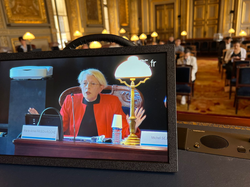
♾️follow Marie-Anne Frison-Roche on LinkedIn
♾️subscribe to the Newsletter MAFR Regulation, Compliance, Law
____
► Full Reference: M.-A. Frison-Roche, "Compliance, Artificial Intelligence and Business Management: the right measure" ("Compliance, Intelligence artificielle et gestion des entreprises : la juste mesure"), participation to the Conference coordinated by Mustapha Mekki, L'intelligence artificielle et la gestion des entreprises. July 1st, 2022.
____
🎥 see the conference (in French)
____
consult the slides having been used as brief notes for deliver the lecture (inf French)
____
🚧read the bilingual Working Paper having been used as basis for this conference
____
📝This work will be the basis for an article.
____
► Summary of the Lecture: Of the next European Regulation on artificial intelligence, the European Commission has a quite neutral conception of AI for obtaining a consensus between the Member States, while the Regulators and certain States have a more substantial conception of technology, wanting its power to be used to protect people, firstly from these new tools themselves, secondly from what is an amplification of the evils of the classic world, such as hate or misinformation. This is the reflection of two conceptions of Compliance.
Firstly, Compliance can be defined as neutral processes that increase the effectiveness of what would be the obligation for companies or their desire for efficient risk management (in particular the consideration of "legal risks") to prove being "conform" to all regulations that are applicable to itself and all persons to whom the firm is accountable. This is often referred to as the "compliance obligation" or "obligation of conformity".
This conception implies considerable practical consequences for the company which, in order to succeed in this "total exploit", would then have to resort to artificial intelligence tools constituting a "total and infallible solution", which mechanically generate for it the obligation to "know " all the "regulatory mass", to detect all "non-compliances", to conceive its relationship to the Law in terms of "risk of non-compliance", fully supported by Compliance by Design which could, without human intervention , eliminate legal risk and ensure "compliance total efficiency" in Ex Ante.
The "legal price" of this technological dream is extremely high because all the "regulatory" requirements will then be transformed into obligations of result, any failure generating liability. The Compliance probationary system will become overwhelming for the company, both in terms of burden of proof, means of proof, and transfers, without exemption from proof. Objective responsibilities for others will multiply. The "law of conformity" will multiply Ex Ante systemic penalties, the border with criminal law being less and less preserved.
It is essential to avoid this, both for businesses and for the Rule of Law. For this, we must use Artificial Intelligence to its proper extent: it may constitute a "massive aid", without ever claiming to be a total and infallible solution, because it is the human who must be at the center of the compliance system functioning thank to the firms and not the machinery.
For this, it is necessary to adopt a substantial conception of Compliance Law (and not a sort of Conformity Law or Obedience Law). It does not at all cover all the applicable regulations and it is not at all "neutral", being in no way a series of processes. This new branch of Law is substantially built on Monumental Goals. These are either of a negative nature (preventing a systemic crisis from happening, in many but specific perspectives: banking, financial, health, climate, etc.), or of a positive nature (building a better balance, in particular between human beings, in the company and beyond).
In this conception which appears more and more strongly, artificial intelligence finds its place, more modest. As Compliance Law is based on information, Artificial Intelligence is essential to capture it and make first connections, first stages for successive analyses, done by human beings, making what is essential: the commitment of the company, both by the leaders and by all those who are "embarked" by a "culture of Compliance" which is at both built and common.
This restores the required seal between Criminal Law and what can be asked of the mechanical use of Artificial Intelligence; this puts the obligation of means back as a principle. This restores the principal place to the lawyer and the compliance officer, so that the culture of compliance is articulated with the specificities of a sector and the identity of the company itself. Indeed, the culture of compliance being inseparable from a culture of values, Compliance by design requires a dual technique, both mathematical and legal culture. It is why European Compliance Law, because it is rooted in the European humanist tradition, is a model.
________
For further:
📘Frison-Roche, M.-A. (ed.), Compliance Monumental Goals, 2022
📘Frison-Roche, M.-A. (ed.), Compliance Jurisdictionalisation, 2022
📘Frison-Roche, M.-A. (ed.), Compliance Tools, 2021
📓Frison-Roche, M.-A., L'apport du Droit de la Compliance à la Gouvernance d'Internet, 2019
📕Frison-Roche, M.-A. (ed.), Pour une Europe de la Compliance, 2019
📕Frison-Roche, M.-A. (ed.), Régulation, Supervision, Compliance, 2017
📕 Frison-Roche, M.-A. (ed.), Internet, espace d'interrégulation, 2016
📝 Frison-Roche, M.-A., Compliance Monumental Goals, beating heart of Compliance law, 2022,
📝 Frison-Roche, M.-A., Role and Place of Companies in the Creation and Effectiveness of Compliance Law in Crisis, 2022
📝 Frison-Roche, M.-A., Assessment of Whistleblowing, and the duty of Vigilance, 2022
📝Frison-Roche, M.-A., Drawing up Risk Maps as an obligation and the paradox of he "compliance risks", 2021
__________
June 29, 2022
Interviews

► Référence complète : Frison-Roche, M.-A., Droit à l’avortement : « Le processus de sécession est dans la décision » , Entretien avec Laurence Neuer, Le Point, 29 juin 2022.
____
________
June 29, 2022
Compliance: at the moment

► Référence complète : Frison-Roche, M.-A., Seuls les droits subjectifs techniques ne sont pas touchés par l'arrêt Dobbs: c'est sur eux qu'il faut construire une nouvelle théorie de l'entreprise, 29 juin 2022.
___
► Introduction de l'article : Tout d'abord il y a deux types de réaction possible face à un événement critiquable. Elles peuvent se cumuler mais chacune prend de l'énergie. Soit critiquer l'événement condamnable (puisqu'il est critiquable, renforçant ainsi la mauvaise opinion que l'on a de lui) ; soit en limiter la portée (puisqu'il est critiquable, autant faire en sorte qu'il ait le moins d'effet possible).
Que l'arrêt Dobbs v/ Jackson rendu le 24 juin 2022 par la Cour suprême des Etats-Unis soit critiquable, tout le monde en est à peu près d'accord. Des centaines de commentaires vont dans ce sens ; des milliers de réactions vont dans ce sens. L'on peut continuer à le critiquer. Cela renforce l'opinion que l'on a déjà. Cela prend de l'énergie.
Peut-être vaut-il mieux utiliser son énergie à limiter la portée de cet arrêt. Mettre son énergie dans cet effort-là. Or cet effort en requiert beaucoup. Donc puisqu'il est acquis que cet arrêt est critiquable, concentrons-nous sur les moyens pratiques d'en limiter la portée.
L'on songe à modifier le Droit français en inscrivant le droit à l'avortement dans la Constitution (I). Mais si l'on revient aux Etats-Unis, car l'arrêt de la Cour suprême n'a pas de portée sur le Droit constitutionnel français, il faut mesurer que tous les droits subjectifs "politiques" non-ancrés dans "l'histoire américaine" sont touchés par l'arrêt du 24 juin 2022, la portée de l'arrêt allant bien au-delà du droit à l'avortement (II). La Cour est donc délivrée de la totalité de sa propre jurisprudence, ce que ne sont pas les cours constitutionnelles européennes, et c'est en cela que l'arrêt est catastrophique car non seulement il touche tous les droits subjectifs "politiques", mais il efface toute la jurisprudence de la Cour concernant les droits subjectifs "politiques" que l'on pourrait dire "nouveaux" (III). Plus encore, trois jours après, la Cour suprême a rendu un arrêt concernant un droit politique ancré dans l'histoire américaine, le droit à la liberté d'expression, qu'elle a interprété très largement, pour bloquer le licenciement d'un enseignant sportif d'une école publique qui faisait des prières sur le terrain de sport, procédant ainsi à un revirement de jurisprudence. La Cour ne serait donc pas non plus liée par sa jurisprudence sur les droits subjectifs politiques ancrés historiquement, pouvant les interpréter d'une façon conservatrice, sans "conserver" l'interprétation "progressiste" que la Cour en avait faite (IV). La solution serait donc de travailler sur ce qui reste : les droits subjectifs non-politiques : or, ce sont des droits auxquels les juristes conservateurs, qui dominent la Cour, sont attachés parce qu'ils sont liés à la liberté contractuelle et à la liberté d'entreprendre. Ils seront en mauvaise position pour les restreindre. Cela désigne ceux qui vont devoir, et pouvoir, défendre les femmes, et plus généralement les êtres humains, aux Etats-Unis : les entreprises (V).
____
Lire les développements de l'article ⤵️
June 21, 2022
Interviews

Référence complète : Frison-Roche, M.-A., L'efficacité de la compliance illustrée par l'affaire Youporn, entretien avec Olivia Dufour, 21 juin 2022.
____
____
May 9, 2022
Publications

► Référence complète : Frison-Roche, M.-A., Notes prises pour la synthèse sur le vif de la conférence L'office du juge et les causes systémiques, in Cycle de conférences, Penser l'office du juge, Grand Chambre de la Cour de cassation, 9 mai 2022, 17h-19h.
____
► Résumé des notes prises au fur et à mesure de la conférence : les trois juges, Christophe Soulard, Président de la Chambre criminelle de la Cour de cassation, Fabien Raynaud, Conseiller d'Etat, et François Ancel, Président de la Chambre internationale de la Cour d'appel de Paris, invités à réfléchir et réagir à une hypothèse, à savoir l'existence parmi les cas qui leur sont apportés par les parties, sont intervenus à la fois d'une façon très diverse, très originale et exprimant pourtant l'unicité de l'art de juger.
Les notes prises ci-dessous montrent que les juges ont conscience que les temps ont changé et que, de plus en plus, les "systèmes" sont présents dans les causes qui, construites par les parties, leur sont présentées (1). Leurs analyses, réactions et propositions ont montré à ceux qui les écoutaient que pour appréhender des causes systémiques, les juges doivent être expérimentés (2). Ils ont eu souci de fixer des critères pour identifier la nature systémique des causes parmi la multitude de celles qu'ils traitent, justifiant alors un traitement procédural et décisionnaire particulier (3). L'auditoire a ainsi pu mesurer la part qui revient aux parties (4), puisque le système est dans la construction des faits de la cause et la part qui revient à l'office du juge (5).
Il apparaît alors que par un effet de miroir, l'office du juge se déplace de l'Ex Post vers l'Ex Ante (6), les trois juges décrivant et proposant des mécanismes concrets pour appréhender en Ex Ante cette dimension systémique et y répondre (7). Ils soulignent que cela s'opère en collaboration avec les avocats, dans une instruction élargie et le débat contradictoire (8), dans une collaboration qui s'opère en amont (9). Les trois magistrats ont recherché les techniques procédurales pour accroître la plus grande considération des systèmes (10) et les nouvelles organisations à mettre en place pour répondre à cette dimension systémique de certaines causes (11). Pour ce faire, une dialectique est à opérer vers, à la fois, de l'informel mais aussi plus de formel (12), l'ensemble produisant une meilleure réception méthodologique des systèmes par les juges (13) par une plus grande compréhension entre les juges, quel que soit leur niveau et les droits substantiels en cause, les autorités et les parties systémiques (14).
____
🎥Voir la vidéo de l'ensemble de la conférence
🎥 Voir la vidéo de la synthèse réalisée sur le vif par Marie-Anne Frison-Roche au terme de la conférence
____
📝Lire l'article de Marie-Anne Frison-Roche rendant compte au Dalloz de la conférence.
____
🚧 lire le document de travail L'hypothèse de la "cause systémique, réalisé préalablement à la conférence, pour préparer celle-ci.
_____
✏️ lire les notes exhaustives prises pendant la conférence⤵️
April 21, 2022
Thesaurus : Doctrine
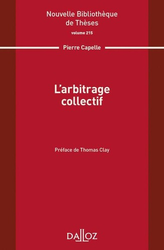
► Référence complète : P. Capelle, L'arbitrage collectif, préf. Th. Clay, Dalloz, coll. "Nouvelle Bibliothèque de Thèses", vol. 215, 2022, 646 p.
____
► Résumé de l'ouvrage : La thèse consiste à montrer que les litiges collectifs gagnent à être résolus par la voie de l'arbitrage, lequel prenant alors la forme de "l'arbitrage collectif", par exemple dans les conflits collectifs de travail. L'auteur considère que rien ne s'oppose à l'arbitrabilité de ces conflits collectifs, lesquels ne prêtent au mécanisme de la clause compromissoire.
Mais parce qu'il y a une partie collective à l'arbitrage, l'auteur propose alors d'adapter les règles procédurales en conséquence, avec l'importation des mécanismes caractéristiques des recours collectifs, comme le opt in ou le opt out.
L'auteur propose également de donner un effet très large à la sentence rendue au terme d'un arbitrage collectif, à travers une exécution très ferme et
_______

Updated: April 4, 2022 (Initial publication: Oct. 4, 2021)
Publications

🌐follow Marie-Anne Frison-Roche on LinkedIn
🌐subscribe to the Newsletter MAFR. Regulation, Compliance, Law
____
► Full Reference: M.-A. Frison-Roche, The Hypothesis of the category of Systemic Cases brought before the Judge, Working Paper, October 2021 and April 2022.
____
► This working paper has served as the basis for an introductory speech 🎤L'hypothèse de la catégorie des causes systémiques (The Hypothesis of the cateory of Systemic Cases), in a more general conference which I coordinated and moderated, 🧱L'office du juge et les causes systémiques, which is part of a general cycle covering Penser l'office du juge, specific conference attending the 9th May 2002 into the Grand Chamber of the Cour de cassation.
This Working Paper was drawn up in October 2021 to build the conference on the assumption that among the diversity of "cases" brought to the courts by litigants, some constitute a specific category: "systemic cases", justifying treatment that is both specific (in that they are systemic, calling in particular for procedural solutions common to all and distinguishable from the treatment of non-systemic cases) and common treatment beyond the diversity of judges who deal with them (judicial and administrative judges, criminal and non-criminal judges, French and non-French judges, judges of the member-States legal orders and European Union judges, etc.).
This working paper does not aim to deal with the whole subject, i.e. both to determine this category of "systemic causes" and the consequences that must be drawn from it for the judge's office, since that is the very purpose of the conference, which is built around several presentations: it aims to deal with the first part of the subject, i.e. the very existence of this new processual category, which is "systemic causes", leaving for other work the practical consequences to be drawn from it in the processual treatment that it calls for.
____
📝This Working Paper is also the basis of a forthcoming article
____
► Summary of the Working Paper: xx
________
Read below the developments⤵️
March 31, 2022
Thesaurus : Doctrine

► Full Reference: E. Silva-Romero & R. Legru, "What place is there for compliance in investment arbitration?", in M.-A. Frison-Roche (ed.), Compliance Jurisdictionalisation, Journal of Regulation & Compliance (JoRC) and Bruylant, coll. "Compliance & Regulation", to be published.
____
📘read a general presentation of the book, Compliance Jurisdictionalisation, in which this article is published
____
► The summary below describes an article that follows an intervention in the scientific manifestation Compliance et Arbitrage, co-organised by the Journal of Regulation & Compliance (JoRC) and the University Panthéon-Assas (Paris II). This conference was designed by Marie-Anne Frison-Roche and Jean-Baptiste Racine, scientific co-directors, and took place in Paris II University on March 31, 2021.
In the book, the article will be published in Title III, devoted to: Compliance et Arbitrage.
____
► Summary of the article: The authors emphasize the new and growing place of Compliance in International Arbitration, particularly in the requirement of respect for ethical values, since arbitrators can implement Ethics, sometimes lacking in international trade, or even must put their power only at the service of investors who respect the Rule of Law.
Thus, Compliance is deployed through the classic control by the arbitrators of the legality of the investment, which applies both to the establishment of the treaty itself and to the investor. In a more recent way, the arbitrator can control about an investment project a sort of "social license to operate" of the investor, concept related to the social responsibility of the companies, appeared for the protection of the peoples indigenous. Moreover, Compliance can justify a substantial assessment by the arbitrator of the effective respect of the human rights and the environment protection via an investment treaty, the State party remaining able to act for the effectiveness of these concerns.
____
🦉This article is available in full text to those registered for Professor Marie-Anne Frison-Roche's courses
________
March 29, 2022
Conferences
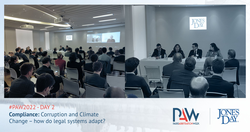
 ► Full reference: Frison-Roche, M.A., The part of Compliance Law in the fight against Corruption and Climate Change, in Paris Arbitration Week (PAW), Compliance: Corruption and Climate Change - how legal systems adapt?, Jones Day, March 29, 2022.
► Full reference: Frison-Roche, M.A., The part of Compliance Law in the fight against Corruption and Climate Change, in Paris Arbitration Week (PAW), Compliance: Corruption and Climate Change - how legal systems adapt?, Jones Day, March 29, 2022.
Debate with Mathias Audit coordinated by Claire Pauly, Vice-President of the Paris Arbitration Week.
____
► Presentation of the intervention: After the presentation made by Mathias Audit of the consideration of facts of corruption, notably by the red flags method, in an arbitration trial, it seems a low-performing system of proof in compliance: the more diligent a party is in showing that it tried to meet its compliance obligations, the more it is exposed to demonstrating its own failure to doing so. It seems a perversity … Therefore, I can understand why companies often so dislike Compliance Law because more they make efforts, more they put money and more they are punished…
But this representation is not totally exact.
My first observation is about the definitions themselves. It is particularly important to have a precise definition of “compliance obligations”, to not confuse them with obligations coming from Criminal Law. The confusion between Criminal Law and Compliance Law is frequent, maybe because what Compliance Law want to eradicate is also prohibited by Criminal Law, for instance corruption. Indeed, technically criminal legal rules and compliance legal rules have many points of contacts, but they are not the same: the obligations are different, the legal persons obliged are different, the reasoning are different the purposes are different.
Because the general definition of Criminal Law and Compliance Law are different. Criminal Law, very old branch of Law, which prohibits and sanctions corruption, does it for everyone because the singular behavior is wrong (to corrupt; to be corrupted). Compliance Law is a very new branch of Law, is a systemic branch of economic Law, which wants to eradicate in the future mechanisms because they destroy economic systems, such as corruption does. Its wants that not to protect moral values but to protect economic systems. Therefore, Compliance Law asks some entities, large companies, to do something only because they are in position to do so: to detect and to prevent this corruption, in order to obtain in the future, the protection against this systemic risk threating the economic systems. The compliance legal tools are more in Ex Ante than in Ex Post: risk mapping, audit, code of conduct, training, obtention of information through the chains of suppliers.
The proof to give is not the non-corruption everywhere from everyone but this concrete action of prevention and education, companies being entities helping public authorities in this global fight.
More precisely, in this definition Compliance Law is not the general obligation to obey the regulations applicable (because this is simply the definition of Law itself, applicable to everybody). Compliance Law is a very new branch of Law which exists only for some systemic “global policies” (as the title of your manifestation says) applicable only on systemic entities (large companies) in a global perspective: for instance, fighting corruption, fighting money laundering, fighting climate change, fighting discrimination between human beings.
In your example, for fighting corruption, specific legal obligations are taken, such as FCPA (with extraterritorial effects) or in French legal system the so-called the 2016 “Sapin 2” Law. These obligations don’t concern everybody: they concern entities in position to do so: large companies.
My second remark is about the burden of proof. These compliance obligation or compliance duties are obligations of means. Companies are obliged to adopt Compliance plans, organize risk mapping, and so on. A lot of them organize them through code of compliance, or code of ethic, or code of corporate social responsibility, because Compliance Law is in an intimacy with Corporate Law. Because Compliance Law is a very concrete branch of law, these disposals are adopted at the level of the group and replicated in the contracts with suppliers.
But he success of these compliance tools is only an obligation of means. For instance the supervisory authority does not require the company to have seen all the risks, in their existence or their exact quantification. In this sense, about money laundering, the French Financial Markets Authority said that the setup of these compliance tools must be “effective”, but after that the company must only do its “best efforts” to aim an “efficient” result (obligation de moyens). The French Regulatory Authority for the digital space says the same about the eradication of speeches of hate that Compliance Law oblige digital companies to fight (using the term of obligation de moyens).
Moreover, about corruption, the Commission of sanction of the French Anticorruption Agency said in a decision of July 2019 that the firm is free to choose the technics to detect and to prevent the corruption (confirming that Compliance is not just following what the Regulator says), but offered a legal certainty: if the company just follows what the Regulators had said in its guideline (rule based compliance behavior), it is no more possible to punish it.
My third remarks could be a proposal for a more efficient system of proof. It is true that the burden of proof is on the company’s shoulders. But the object of proof is not the absence of corruption (it would not be possible…). The object of proof is the existence of due diligence to detect and prevent corruption.
Companies must prepare that, must constitute these proofs by advance. “Due diligence” is a legal concept frequently used in Compliance Law. Regulators, supervisors, and courts ask companies to show the reality of these diligences. It would not be sufficient to present the cost of Compliance… It will be sufficient to show the effectivity of Compliance programs freely adopted, taking in consideration the guidelines released by public authorities.
Public authorities say they want to help companies to diffuse an effective “culture of compliance” : a dialogue with civil and corporate courts, not only with criminal courts would be efficient, for instance for the protection of human rights.
In a second part of this debate, on Climate change and Compliance, Claire Pauly asked the question: "My question is two-fold: do you consider that climate change issues should be treated in the same way as corruption issues? And do you think that arbitrators are well suited to tackle those issues, by upholding the method applied to determine and demonstrate corruption issues?".
The response has been:
Firstly, on the technical similarity between fighting Corruption and fighting Climate Change in Compliance Law, it is the same perspective effectively.
If we come back to the definition of Compliance Law, the Compliance tools are organized to obtain in the future systemics results, such as no more corruption, no more money laundering, what we can name “Monumental goals”. This is a political decision: to design the future for excluding some systemic catastrophes. Corruption is an example of systemic risk; but climate change is another one.
Fighting against Climate Change is a Monumental Goal, of the same nature than fighting Corruption.
As everyone knows, we suffer of a lack of tools to address one of this fundamental challenge of our times which is climate change (more difficult than corruption...). But we are lucky to have some Compliance legal tools: we need to use them, because we have so few techniques about this Climate issue…
And Compliance Law is the more adequate branch of Law because it is an Ex-Ante branch of Law : generally, its obligations are on the future, and the Climate change drama is in the future also.
We can already see that Compliance Law is applicable to Climate Change issue
It is easy to see it through the legal techniques.
In the French legal system, the Sapin 2 law invented in 2016 some new compliance techniques, such as risk mapping, audit, due diligence, to detect and prevent corruption.
One year after, in 2017, the so-called Loi Vigilance took the same techniques, copying exactly the legal dispositions of Sapin 2 in this law to oblige large companies to detect and to prevent violation of human rights and environmental obligation, not only inside the corporate group but also through the supply chains. The manager will be accountable for that.
On February 23, 2022, the European Commission adopted a proposal for a European Directive in the same direction of a “global policy” to impose a “corporate sustainability due diligence” on large companies, notably for fighting climate change. This new text will be effective in two years in the Internal legal systems.
By a rules-based analysis and a principle-based analysis, we can see this is the same reasoning.
Of course, this “corporate sustainability due diligence” is only an obligation of means.
But it is extremely ambitious, linked to the direct consideration of the Corporate Social Responsibility.
And I guess it will be efficient because all these tools are not only Ex Post but also Ex Ante: when the issue is to exclude the catastrophic perspective of the disappearance of the humankind on our planet, having Compliance Law, this Ex-Ante branch of law, is so precious!
Secondly, about the role of Arbitration in this issue, I am tempted to say: everyone is required in this global crucial policy!
It is quite difficult for a national court to decide on this sort of issue because Climate change is a global issue, while arbitrators are global judges.
Technically it is necessary and technically possible that Arbitration takes its place, because these due diligences about detection, prevention, action for a better Climate balance are organized non only in corporate mechanisms, such as code of conduct, corporate commitments, or manager remuneration calculation, but also a lot of contractual dispositions.
We will see a lot of new legal techniques: a lot of international public global policies will be adopted. The obligation to give information about that not only to investor but also to stakeholders will be adopted worldwide. The technique of “compliance by design” will be used on the corporate policy of fighting against Climate change.
Meanwhile, the classical branch of law, were Compliance Law steps in, will remain active, such as International Law, Corporate Law, Tort Law Contract Law, where Arbitration is so central.
So, in short, your question was: are Arbitrators able to deal with climate change issue? my response is: “oh, yes!”
____
► Read the repport made by the fait par la Paris Week of Arbitration ( on the distinction between Compliance Law and Criminal Law, and their articulation)
____
Pour aller plus loin⤵️
📘Frison-Roche, M.-A. (ed), Compliance Monumental Goals, 2022.
📘Frison-Roche, M.-A. (ed), Compliance Jurisdictionalisation, 2022.
________
March 24, 2022
Interviews

► Full Reference: Frison-Roche, M.A.,, "Faire du Droit pour qu'à l'avenir le monde soit moins injuste" - à propos du projet de directive européenne sur le devoir de vigilance ("Making Compliance Law for a world less unfair in the future" - about the draft European directive on the corporate sustainability due diligence), interview with Olivia Dufour, Actu-Juridique, March 24, 2022.
____
💬 read the interview (in French)
___
► Interview English Summary: This interview comments on the draft directive presented by the European Commission aimed at unifying European Union Law about Corporate Sustainability Due diligence in global supply chains to protect environnement and human rights effectively, putting companies under same legal rules. including non-European companies.
The interview emphasizes that this text and reinforces Compliance Law perspective in that the legal instruments are Ex Ante, aim at the functioning of groups, constitute incentives, and seek effectiveness to prevent violations of human rights and the environment, 80% of which taking place outside the European Union.
The goal is both ethical, for example to fight against child labor and the endangerment of people, and systemic: the promoting of a sustainable economy, through the help of companies which have some power in value chains which are global.
This future directive clearly shows the difference between simple "conformity" (just obeying all applicable regulations...) and "compliance", illustrated here: aiming to achieve "monumental goals", here fighting against attacks on the climate balance and protect people, to obtain in the future these damages do not occur or are reduced.
________
March 17, 2022
Thesaurus : Doctrine
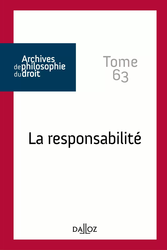
► Référence complète : Archives de Philosophie du Droit (APD), La responsabilité, t. 63, Dalloz, 2022, 505 p.
____
📗lire la 4ième de couverture de l'ouvrage
____
📗lire le sommaire de l'ouvrage
____
► Résumé de l'ouvrage : Les discussions autour de la réforme du droit de la responsabilité civile se poursuivent aujourd'hui dans et hors du Parlement depuis la proposition de loi sénatoriale de juillet 2021. Le tome 63 des Archives de philosophie du droit apporte sa contribution essentielle au débat sur la responsabilité, son rapport avec la liberté et son adaptation aux nouveaux enjeux de la société, tout en lui conservant son rôle de prévention, de régulation et de sanction.
Le volume comprend ainsi une trentaine de contributions de civilistes mais aussi de publicistes, d'historiens, de philosophes, comme celles des plus hauts Magistrats. Il constituera donc une référence incontournable pour la réflexion juridique actuelle comme pour celle des prochaines années.
____
Voir la présentation d'autres tomes des Archives de Philosophie du Droit.
________
March 10, 2022
Conferences

► Référence complète : Frison-Roche, M.-A., "Secrets professionnels : spirale d'une importance accrue et d'un affaiblissement fulgurant", participation à la Table-Ronde sur le thème du secret professionnel, in Comité de Liaison des Institutions Ordinales (CLIO), Secret professionnel et indépendance : deux leviers, garants de l’efficacité et de la confiance envers les professions réglementées, 10 mars 2022.
Cette Table-Ronde est animé par Fabrice Lundy, journaliste à Radio-Classique ; y participent également Jean-Luc Sauron, Conseiller d'Etat et Jacques Lucas, Président de l'Agence du Numérique en Santé.
____
►Lire la synthèse écrite du colloque
____
► Revoir la vidéo de la table-ronde
____
► Résumé de l'intervention : Le thème du secret professionnel est appréhendé comme illustration du rôle essentiel joué par les Ordres professionnels dans le monde d'aujourd'hui (le colloque traitant dans un second temps de la question de l'Indépendance).
Avant toute participation active au débat proprement dit, l'intervention a pour utilité de présenter le Secret professionnel en lui-même, puis en quoi le monde actuel apporte des éléments nouveaux au besoin impératifs de celui-ci, dans le même temps qu'il le met particulièrement en difficulté.
I. LA PERMANENCE DES SECRETS PROFESSIONNELS
Le Secret professionnel, comme tout secret, porte sur une information. C'est une information qu'une personne a sur elle-même ou sur une autre, et qui potentiellement peut mettre cette personne en danger, ou la fragilise, ou l'expose, la constituant en situation de faiblesse par rapport à autrui : l'information peut concernant son état de santé, sa filiation, un acte dont un autre pourrait se prévaloir pour la punir plus tard.
Cette information, que la personne garde pour elle ou qu'elle partage avec peu de personnes, elle va la confier à un "professionnel". Pas n'importe quel professionnel : un professionnel en qui elle a confiance, non seulement parce qu'elle croît qu'il est techniquement compétent (un avocat qui connait le Droit, un médecin qui connait la Médecine) mais parce qu'elle croit qu'il va lui aussi garder pour lui cette information sur la faiblesse de son client, malgré le profit qu'il pourrait tirer de la communiquer à d'autres (presse, juge, voisin de table dans un diner, etc.). C'est donc la confiance que la personne en situation de faiblesse a dans le titre même de la personne, parce qu'il est "avocat" ou "médecin" ou "infirmier", etc., qu'il donne cette information, car il sait que parce qu'il est médecin (et pas seulement parce qu'il connait la Médecine), qu'il garde ce secret. Ainsi ce n'est pas le diplôme comme signe de compétence mais le titre comme signe d'appartenance à une profession qui garde les secrets qui est considéré : c'est pourquoi la profession va pouvoir valoriser cette garde des secrets au-delà des frontières par des associations (American Bar Association, par exemple), si elle peut crédibiliser cela (Ordre et secret sont intimes).
Le rapport que le professionnel, nouveau titulaire de l'information, a avec celle-ci découle de cela. Le professionnel est le "gardien" de l'information. Il n'en dispose pas : la personne concernée lui a confié non pas tant l'information que "la garde de l'information". Il exerce donc sur ce secret, c'est-à-dire le fait de ne pas révéler à autrui l'information, un pouvoir📎
Cette conception juridique est stable depuis que les professions, notamment les professions libérales, existent : ce n'est pas par les compétences techniques, ni même par le lien personnel, que le secret professionnel se noue : c'est par l'appartenance à une profession : c'est donc par l'organisation même de cette profession et la crédibilité de celle-ci, le contrôle à l'entrée de qui y entre et doit en sortir en cas de manquement, l'effectivité, l'efficacité et l'efficience de la discipline.
Tout cela n'est pas remis en cause. Au contraire, plus l'Etat a des difficultés en raison de la disparition des frontières et plus cette structure devient en pratique pertinente.
____
Mais le choc vient d'ailleurs. Il faut du fait que précisément si les secrets que nous avons tous en nous et que nous voulons tous donner à garder n'ont pas changé, en revanche le monde dans lequel nous vivons a changé : ce monde est devenu numérique.
II. LE CHOC DU NUMERIQUE SUR LES SECRETS PROFESSIONNELS ET L'URGENCE DE LES ACCROITRE
Or, par cette transformation totale du monde dans lequel nous vivons les secrets n'existent plus, les secrets professionnels pas moins mais pas plus que les autres.
Il faut mais il suffit qu'une "fuite" apparaisse dans l'espace digital et l'information est disponible à la fois partout et en un instant : la viralité est la loi naturelle de l'espace numérique qui recouvre le monde.
L'on peut s'en réjouir, parce que l'information est un bien commun, que nous sommes dans un marché de l'information, une économie de l'information, une société de l'information, une civilisation de l'information.
Si l'on est plus mesuré, l'on dira que certaines informations doivent être gardées par ceux qu'elles concernent et dans le cercle choisi des personnes qui ont leur confiance : c'est l'invention européenne des "données à caractère personnel", qui recoupent largement les secrets professionnels.
Pour l'instant, le Droit tâtonne tant la situation est nouvelle ...
Tout d'abord, le Droit est dans une sorte d'adoration de l'information disponible sur tout, partout et pour tous... Il y développe des principes comme le "droit à l'information" (sans contrepartie financière), le "droit d'alerte" (vite confondu avec le droit de divulguer publiquement, qui n'existe pas ab initio n'apparaissant qu'en cas d'échec du mécanisme d'alerte, le "droit à la transparence" (qui méconnait l'idée même de droits de la défense) qui vont aller de plus en plus contre les secrets, même professionnels.
Ensuite et surtout, la technologie numérique, qui a structuré l'espace numérique fait qu'une information à l'instant où elle est mise dans cet espace est diffusée immédiatement, partout et demeure disponible pour toujours.
Dès lors, l'on peut toujours continuer à affirmer le principe des secrets professionnels, ceux-ci n'ont plus d'effectivité.
Or, et c'est lors le paradoxe, l'espace numérique non seulement n'a pas diminué la fragilité des personnes, fragilité compensée par la confiance dans la garde des secrets conservés par les professionnels ; au contraire le numérique a accru cette fragilité.
Les revenge porn ou les meurtres en direct en sont un exemple : la personne est encore plus fragile dans l'espace numérique. Les "discours de haine" sont un enjeu majeur, non seulement pour la personne qui en est la victime mais pour le système lui-même puisque, comme le démontre Thimothy Snyder c'est aujourd'hui le système démocratique qui peut chuter.
La "désinformation" peut partir d'une violation d'un secret professionnel, car il peut s'agir d'une information exacte exploitée à des fins nocives, constituant alors une infox, le conspirationnisme étant un phénomène lié au numérique.
Que peut faire le Droit ?
Il peut aller dans deux directions :
Tout d'abord armer davantage les structures classiques : Ordres professionnels, police, Autorités de poursuites et Juridictions.
Ensuite, internaliser dans les opérateurs numériques cruciaux, notamment les plateformes, le devoir de bloquer en Ex Ante la diffusion des informations qui doivent demeurer secrètes (données à caractère personnel, et secrets) : c'est le "Droit de la Compliance".
L'exercice de ce devoir par les entreprises numériques cruciales est lui-même supervisé par des autorités publiques : en France, la CNIL et l'Arcom.
De nouveaux textes sont en cours d'adoption pour obliger les entreprises cruciaux de veiller à ce que les secrets ont préservés. C'est l'un des enjeux du Digital Services Act, Réglement de l'Union européenne en cours de discussion.
L'avenir est certainement dans un rapprochement entre les structures classiques, notamment les ordres et ses Autorités publiques de supervision.
Le Droit de la Compliance, nouvelle branche du Droit Ex Ante qui concrétise la garde des secrets peut être une solution dans cette situation à la fois très nouvelle et très préoccupante.
____
► aller à la présentation d'une précédente participation au colloque annuel du CLIO : La déontologie professionnelle dans un monde ouvert et concurrentiel
► voir la publication qui s'en suivit.
___
► pour aller plus loin :
👩🏫Frison-Roche, M.-A., 📝Les droits subjectifs, outils premiers et naturels du Droit de la Compliance, in Frison-Roche, M.-A., 📕Les outils de la Compliance, 2021
👩🏫Frison-Roche, M.-A.,💬 "Et si le secret de l'avocat était l'allié de la lutte contre le blanchiment ?", 2020
👩🏫Frison-Roche, M.-A., 📕Avocats et Ordres au 21ième siècle, 2017
👩🏫Frison-Roche, M.-A., 📕Secrets professionnels, 1999
👩🏫Frison-Roche, M.-A., 📝Déontologie et discipline des professions libérales, 1998
________
Frison-Roche, M.-A., Concevoir le pouvoir, 2022.
Frison-Roche, M.-A., Concevoir le pouvoir, 2022.
March 8, 2022
Hearings by a Committee or Public organisation
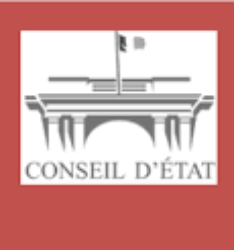
🌐suivre Marie-Anne Frison-Roche sur LinkedIn
🌐s'abonner à la Newsletter MAFR Regulation, Compliance, Law
____
► Référence complète : M.-A. Frison-Roche, audition par la Commission des Lois du Sénat sur la Proposition de Loi constitutionnelle relative à l'interruption volontaire de grossesse et à la contraception, 27 septembre 2022.
►Référence complète : M.-A. Frison-Roche, Audition par la Section du Rapport et des Etudes du Conseil d'Etat pour la préparation du Rapport annuel sur Les réseaux sociaux, Conseil d'Etat, 8 mars 2022.
____
►Résumé de la présentation faite avant la discussion : Pour la partie reproductible de cette audition, consistant dans la présentation qui a pu être faite de la relation entre le Droit de la Compliance et le phénomène des réseaux sociaux, il a été repris l'idée générale d'un impératif de "réguler un espace sans ancrage" et l'apport que représente pour cela le Droit de la Compliance, dès l'instant qu'il n'est pas défini comme le fait de "se conformer" à l'ensemble de la réglementation applicable à l'agent mais comme la charge d'atteindre des "Buts Monumentaux", négatifs ou/et positifs, l'opérateurs ainsi chargé de cette obligation de moyens parce qu'il est en position de le faire, devant avoir la puissance pour y parvenir.
Se dégagent alors des notions nouvelles, comme la "Responsabilité Ex Ante" ou une notion de "Pouvoir" qui est commune aux opérateurs de droit privé et de droit public, leur nationalité venant également en second plan, le Droit de la Compliance étant naturellement a-territorial.
Cette définition substantielle du Droit de la Compliance qui met en première ligne les opérateurs requiert que ceux-ci soient supervisé (dans un continuum entre Régulation, Supervision, Compliance,) le Droit de la Compliance opérant un continuum du Droit de la Régulation en n'étant plus lié avec l'impératif d'un secteur. Les opérateurs cruciaux numériques sont ainsi "responsabilisés", grâce à une "responsabilité Ex Ante", et s'ils sont supervisés par des Autorités de supervision (dont le modèle historique est le superviseur bancaire, ici l'Arcom), c'est le juge qui a fait naitre cette nouvelle notion de "responsabilité Ex Ante, pilier du Droit de la Compliance, aujourd'hui délivré du territoire dans une jurisprudence à propos du Climat qu'il convient de concevoir plus largement.
Ainsi délivré du secteur et du territoire, le Droit de la Compliance peut affronter le mal des réseaux sociaux que sont la désinformation et l'atteinte des enfants, maux systémiques où peut se perdre la Démocratie, perspective face à laquelle l'Ex Post est inapproprié.
Le Droit de la Compliance est donc pleinement adéquat.
Il convient que le Juge continue sa mue en concevant lui-même non pas seulement dans un Ex Post plus rapide, mais dans un office Ex Ante, contrôlant des entreprises qui, elles-mêmes doivent avoir des fonctions des offices de gardiens (ici gardiens des limites concernant les contenus).
______
Voir ⤵️ la structure plus formelle de l'intervention, qui fut ensuite discutée
Feb. 9, 2022
Teachings : Droit de la régulation bancaire et financière - semestre 2022
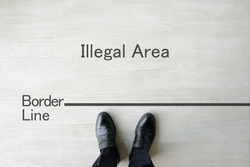
 ► Référence complète : Frison-Roche, M.-A., Prévention et sanction des Abus de Marchés, in Leçons de Droit de la Régulation bancaire et financière, Sciences po (Paris), 9 février 2022.
► Référence complète : Frison-Roche, M.-A., Prévention et sanction des Abus de Marchés, in Leçons de Droit de la Régulation bancaire et financière, Sciences po (Paris), 9 février 2022.
____
► Résumé de la leçon sur les Abus de marché : Dans une conception classique et du Droit et du "libre marché", le principe est la liberté d'action de la personne. Même si l'exercice de cette liberté, voire d'un droit subjectif peut causer un dommage, par exemple un dommage concurrentiel, c'est en quelque sorte le prix légitime d'une société libre et concurrentielle. Ainsi dans une conception libérale, seul l'abus est sanctionné, c'est-à-dire l'exercice fautif que l'on fait de sa liberté ou de son droit, allant parfois jusqu'à l'exigence d'une faute qualifiée.
Mais les secteurs bancaires et financiers ne sont pas gouvernés par le principe de libre concurrence. Ils sont gouvernés par le principe de régulation, le principe de concurrence n'y a qu'un rôle adjacent. Cela ne pourra qu'engendrer de graves difficultés lorsque le Droit de la concurrence et le Droit bancaire et financier font s'appliquer d'une façon cumulée ou confrontée sur une même situation.
Les marchés financiers sont construits sur le principe de régulation qui pose le principe de transparence et de partage d'une information exacte : c'est ainsi que l'intégrité des marchés financiers est assurée, l'Autorité des Marchés financiers en étant le gardien.
La prévention et la sanction des "abus" de marché est donc non pas une part résiduelle du Droit financier, mais un pilier de celui-ci, contrairement au Droit des marchés ordinaires concurrentiels, sur lesquels l'opacité et le non-partage des informations est la règle.
Cela explique l'état du droit des "abus de marché", dont l'effectivité de la prohibition est essentielle pour le bon fonctionnement ordinaire des marchés financiers. Leur prohibition nationale a été harmonisée par le Droit de l'Union européenne, à travers des textes dont les signes reprennent l'appellation anglaise : Market abuses (ainsi le nouveau Règlement communautaire sur les abus de marché est dit Règlement MAR (Market Abuses Regulation) et la directive qui l'accompagne MAD (Market Abuses Directive).
Il sanctionne un certain nombre de comportements, qui portent atteinte à l'intégrité des marchés,
Mais il n'exprime plus des exceptions par rapport à un principe : des fautes par rapport à des libertés ou à des droits. Il exprime des moyens par rapport à des principes dont la sanction des abus ne constitue que la concrétisation de principes dont ils sont la continuité même : l'efficacité du marché, son intégrité, sa transparence, l'information de l'investisseur.
C'est pourquoi la sanction des abus de marché ne sont pas du tout un phénomène périphérique par rapport à la Régulation des marchés financiers et à l'activité et au fonctionnement des bancaires, comme l'est le Droit pénal : elle est au contraire à la fois ordinaire et centrale. Cette différence des deux ordres publics va se retrouver dans la question lancinante de la sanction pénale et de la sanction administrative des mêmes abus de marché (par exemple "manquement d'initié" et "délit d'initié", qui ont tendance à se cumuler dans des techniques de répression qui seront l'objet de la prochaine leçon.
_____
🔎 Accéder aux slides servant de support à la leçon sur les abus de marché
🔎 Revenir aux bases avec le Dictionnaire bilingue du Droit de la Régulation et de la Compliance
🔎 Approfondir par la Bibliographie générale de Droit de la Régulation bancaire et financière
🔎 Revenir à la présentation générale du cours
🔎 Se reporter au plan général du cours
____
Utiliser les matériaux ci-dessous pour aller plus loin et pour préparer votre conférence de méthode ⤵️
Jan. 18, 2022
Thesaurus : Doctrine
► Référence complète : A. Mbengue, "L’amicus curiae devant la Cour suprême des États-Unis", La Revue des Droits de l'Homme, in dossier "Les interprétations concurrentes de la Constitution, III- Interprétations concurrentes et observateurs, janvier 2022, n°21, pp. 1-14
____
► Résumé de l'article (fait par l'auteure) : "L’amicus curiae permet l’intervention des entités défendant des intérêts privés dans le contrôle de constitutionnalité opéré par la Cour suprême des États-Unis. La figure moderne de l’amicus curiae a créé une concurrence entre un intérêt public tel qu’il est conçu par les entités privées avec l’intérêt public tel qu’il est défendu par les organes gouvernementaux. Cela a conduit le juge constitutionnel américain à objectiver les données comprises dans les mémoires des personnes privées dans son interprétation de la Constitution par des méthodes d’appropriation des interprétations concurrentes. Cette appropriation met donc fin à la conception monopolistique de défense de l’intérêt public par les organes gouvernementaux et érige les entités privées comme des experts factuels des questions constitutionnelles. Ainsi, davantage qu’il est un élément procédural, l’amicus curiae est porteur d’une logique politique éminente dans le contrôle de constitutionnalité aux États-Unis.".
____
🦉Cet article est accessible en texte intégral pour les personnes inscrites aux enseignements de la Professeure Marie-Anne Frison-Roche
________
Jan. 13, 2022
Thesaurus : Doctrine

► Full Reference: E. Wennerström, "Some Reflections on Compliance and the European Court of Human Rights", in M.-A. Frison-Roche (ed.), Compliance Jurisdictionalisation, Journal of Regulation & Compliance (JoRC) and Bruylant, coll. "Compliance & Regulation", to be published.
____
📘read a general presentation of the book, Compliance Jurisdictionalisation, in which this article is published
____
► Summary of the article (done by the Journal of Regulation & Compliance): The development of the European Court of Human Rights case law, contributing to European integration, has incorporated the substantial concept of "compliance" which goes beyond the idea of legality with respect to which companies remain passive, and promotes legal orders as systems in interaction with one another.
The author develops the spirit and scope of Protocol 15 by which both the principle of subsidiarity and the margins of appreciation the signatory States are organized, mechanisms governed by the principle of proportionality. Subsidiarity means that the States are in the best position to design the most adequate application of the Convention, the close links between the States allowing its effective application. In addition, the new opinion procedure which allows a national court to have during a case the non-binding opinion of the ECHR ensures better compliance with the objectives of the Convention.
The case-law of the Court takes up this substantial requirement through its doctrine, in particular identified in the Bosphorus case, by stressing that the accession of a State to the European Union presumes its compliance when implementing EU law with the obligations arising from the ECHR, even if this presumption can be refuted if the protection is manifestly lacking, which was admitted in several cases, in particular concerning the right to an impartial tribunal in matters of economic regulation. The different legal orders are thus articulated.
The author concludes that the European Court of Human Rights, like the Court of Justice of the Union, contributes to the construction of Compliance Law in Europe, from an Ex Ante perspective favoring opinions rather than Ex Post sanctions and creating, in particular through the Bosphorus doctrine, elements of security and confidence for European integration around common values.
___
🦉This article is available in full text to those registered for Professor Marie-Anne Frison-Roche's courses
________

Dec. 24, 2021
Publications

🌐 follow Marie-Anne Frison-Roche on LinkedIn
🌐subscribe to the Newsletter MAFR Regulation, Compliance, Law
____
 ► Full reference: M.-A. Frison-Roche, Conceiving Power, Working Paper, December 2021
► Full reference: M.-A. Frison-Roche, Conceiving Power, Working Paper, December 2021
____
📝 This Working Paper serves as the basis for an article to be published in the collective book drawn up in tribute to Professor Emmanuel Gaillard.
____
► Working Paper summary: In 1985, Emmanuel Gaillard's central work came out under the title Le pouvoir en droit privé (The Power in Private Law)📎
Let's give full force to the original title of the thesis.
The deletion of the term notion perhaps implies that by defining something the essential is done, that there would be something of a pleonasm in aiming at The notion of Power and The Power, as Law likes to economise on words.
But it was indeed a renewed, simpler and more powerful conception of the notion of Power, containing the entire regime necessarily imputed, that this work imposed, henceforth illuminating positive Law. Emmanuel Gaillard's definition, on the other hand, goes beyond Private Law. We would gladly have argued in favour of retaining the heading for the term Notion, proposing instead to dispense with the reference to Private Law alone ....
Perhaps it was because the concept is so vast that in this seminal thesis its scope was restricted to Private Law, since the author already had to account for the sheer multiplicity of manifestations in this part of the legal system; Or perhaps it was because the concept of 'Power' is so familiar in Public Law that it would have needed less definition in Public Law (which, moreover, is so diversely proposed in this more political area, which is already careful on principle to distinguish between powers, which must always be plural in order to be separated), and that it was therefore reasonable to want to arrive at a single concept of Power in Private Law, where the notion of subjective rights is more familiar.
However, Emmanuel Gaillard's definition of Power as a prerogative placed, by legal rule or contract, in the hands of the person invested with them for the benefit, at least in part, of others, covers both Public and Private Law. This even contributes to the solidity of this thesis and explains why it flourishes today in legal systems where the distinction between Private Law and Public Law is weakening.
The power of this definition lies in its simplicity. Simple and brave minds are often the most fruitful. As Dean Gérard Cornu points out in his preface, the author, in particular because he bases himself more on positive law, for example that relating to the powers of corporate officers, does not get bogged down in discussions between authors only to end up preferring one over the other. He arrives at a definition that is close to our everyday experience: the one we experience when we collect an envelope on behalf of someone else and the agent asks us in what capacity we claim to be doing this on his behalf. We then show him our 'power', the legal power to do so for the benefit of the person to whom the letter is addressed, and can thus exercise the power to withdraw the letter, even though it is personal. When legal and common sense come together, it is a good omen, not only in terms of form, because everyone can understand it and the Law must remain comprehensible, but also in terms of substance, because everyone must be able to control the exercise of a power that is exercised for and over others. For this letter addressed to someone else, the person who has been able to take it by virtue of the power conferred on him/her, could just as easily open it and read it, then destroy it or give it to the worst enemy of the person to whom it was addressed. In Power, there is always might to do, and the danger to others that Power contains therefore.
This highly legal definition of Power not only distances the holder from his/her own interests, but also channels the Power thus granted to the person who benefits from it. In this respect, Emmanuel Gaillard not only distinguished between Power and subjective right, but also identified the right amount of power required for this power to effectively fulfill this 'Mission', through the notion of abuse of power, when the holder uses for other beneficiaries this power that was conferred on him/her for this sole purpose.
What is more, this concept makes it possible to distinguish Power from discretionary force, because the holder of Power thereby exercises factual , by acting for others, deciding for others, deciding on others. Because Power is inseparable from might, but might must remain the means of power and no more, the Law shall produce the antibodies that are not only the theory of abuse of power but also an Ex Ante responsibility that accounts must always be rendered, either to the other for whom everything is done or to a third party. For this third party is often there from the outset, the guardianship judge for example: because the Power was put in place because of the beneficiary's weakness, both in himself/herself and because of the situation, an impartial and disinterested third party is needed to ensure proper execution from the outset, without there even being a dispute. In this respect, how useful this thesis is for thinking about what Supervision is today!
This thesis, so clear, so simple and so strong, goes beyond Private or Civil Law. It is both much more restrictive than the more factual and political definition of Oower, which would be the ability to do something, and much broader than the usual definitions, since it embraces and legitimises de jure all situations where a person acts legally for the benefit of another. Dean Cornu shows, moreover, in two sentences that such a notion of power also captures the office of the judge, who has power over others only to serve them 📎
Moreover, Power thus contains its own limit in its very definition, since others are present in it: the holder has power only to serve others. From then on, it is only a power because it is a kind of Charge. Emmanuel Gaillard immediately uses the term: "Un individu se voit confier une charge qu'il exerce dans un intérêt au moins partiellement distinct du sien propre" ("An individual is entrusted with an office which he exercises in an interest at least partially distinct from his own") 📎
This definition offered by Emmanuel Gaillard in 1981, anchored in Private Law only insofar as it is the entire legal system, is premonitory of the Regulatory and Compliance Law as it unfolds today. It would be enough to continue the Gaillard's sentences, as if they had been half-written, to finish them 40 years later and find in them the mechanisms of Supervision of companies by public authorities which are now in place not to reduce their power but to ensure that they exercise it for the benefit of others 📎
The definition of Power thus conceived contains within itself its regime and enables us to anticipate it better today: because the holder exercises Power only for others, at least partially, he is consubstantially accountable for it, responsibility being only one form of this accountability; because this service must be effective and others must benefit fully from it, because unlike the subjective right which allows the holder freely not to use his might, Power has never been the 'most absolute' availability to use his/her might: it is even the opposite. It is the expression of a Power assigned to a purpose, compelling the holder to use his/her Power to that end. But it is equally necessary for the holder to have all the might to do so, otherwise the very notion of 'Power' is meaningless. This is the definition that should be given to the principle of Proportionality: the person on whom the Power rests must have not more power than is necessary, but all the power necessary to achieve the Monumental Goals for which the Power has been entrusted to him/her, so that others may derive full benefit from it (II).
In today's positive Law, the definition of Power as a Duty is found not only in Private Law but also in Public Law, not least because pure might, i.e. those that do not account for the use of their might, are in decline while concern for others is on the increase. The days of discretionary powers are over, and the increased independence of those who exercise Power over others requires them to be accountable. Beyond this Accountability, the personal Responsibility of those who have the Power to serve others is being established. But, no doubt because the Law is slow to evolve, the correlative idea that the holder of Power must have all the powers required to carry out his/her mission is less entrenched: As Emmanuel Gaillard has shown, the Law has only gone part of the way in sanctioning excesses of power, when the holder uses his/her power for other goals, but it has not yet clearly established that the holder - sometimes forced - of a Power is legitimate in using all the means required to achieve the result for which this Power, i.e. a charge and a duty, has been conferred on him/her.
No doubt we need to read Emmanuel Gaillard's thesis again in all its potential, to imagine the reading we could do today of what he could have written as if on blank pages that would write themselves, a magical thesis where everything is already there, a thesis so short (250 pages) and so beautiful, so dense that it already contains the Law of the Future. The Law of the Future 📎
____
Lire les développement ci-dessous⤵
Gaillard, E., Le pouvoir en droit privé, préf. Cornu. G., coll. ..., Economica, 1985.
Gaillard, E., La notion de pouvoir en droit privé, thèse .... ;
"En droit processuel, l'office du juge aurait donné à l'auteur un renfort. Pour le juge, il n'est point de pouvoir sans devoir. Au-delà de la distinction de ce qu'il a obligation de faire ou faculté d'apprécier, il y a toujours, au creux de ce qu'il peut, le sceau de ce qu'il doit, un devoir gardien - comme un âme - de l'exercice du pouvoir." (p.5).
n°3, p.9.
🕴️J. Carbonnier, 📗Essai sur les lois, 1992 (on the guardianship).
S. in a general way, 🕴️M.-A. Frison-Roche (ed.), 📕Régulation, Supervision, Compliance, 2017.
Cornu, préface précitée : "Tous les pouvoirs sont, à double face, des pouvoirs-devoirs" (p.5).
On Compliance Law as a Law of the Future, s. 🕴️M.-A. Frison-Roche, 📝Compliance Monumental Goals, beating heart of Compliance Law, in 🕴️M.-A. Frison-Roche (ed.), 📘Compliance Monumental Goals, 2023.
On the consequences for Liability Law, which is now looking to the Future, s. 🕴️M.-A. Frison-Roche, 🚧Ex Ante Responsibility, 2021.
Sur la notion de "Responsabilité Ex Ante", v. Frison-Roche, M.-A., La responsabilité Ex Ante", in Archives de Philosophie du Droit, La responsabilité, 2022.
Dec. 15, 2021
Thesaurus : 02. Cour de cassation
► Référence complète : Com., 15 décembre 2021, n° 21-11.882 (publié au Bulletin).
____
____
📝commentaires de l'arrêt :
- Droit des sociétés, mars 2022, n° 3, comm. 30, pp. 22-25, note J.-F. Hamelin
- JCP E, 17 février 2022, n° 7, comm. 1067, pp. 25-30, obs. B. Dondero
- Rev Int. Compliance, 13 févr. 2022, n° 1, comm. 43, pp. 25-26, obs. H. Berion
- JCP G, 24 janvier 2022, n° 3, act. 86, pp. 146-148, obs. B. Parance
- JCP E, 20 janvier 2022, n° 3, comm. 1020, p. 31
- JCP E, 23 décembre 2021, n° 51-52, act. 882, p. 10
- JCP E, 31 mars 2022, n° 13, chron. 1139, pp. 48-49, R. Raffray
- Rev. sociétés, 7 mars 2022, n° 3, pp. 173-179, A. Reygrobellet
- RTD com., 31 mars 2022, n° 1, pp. 33-36
________